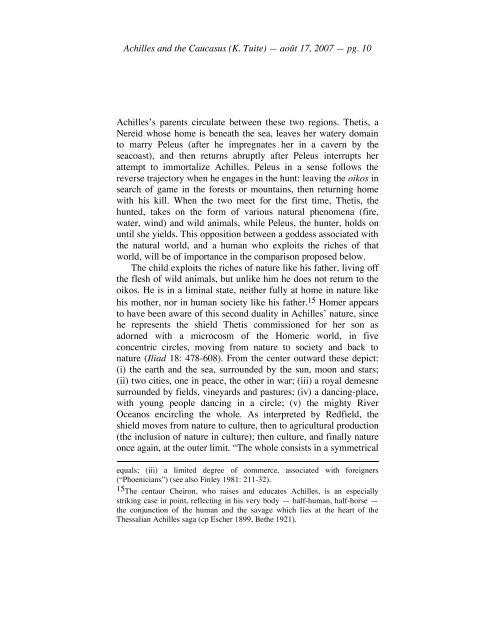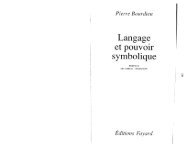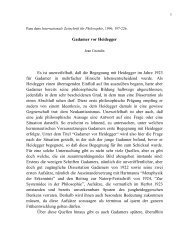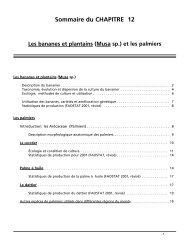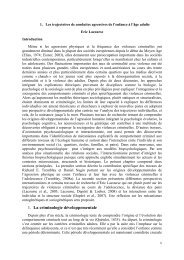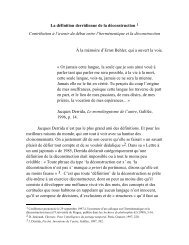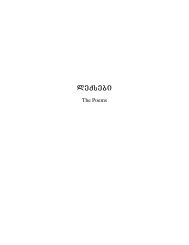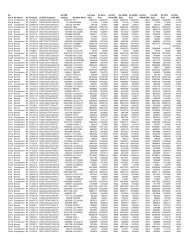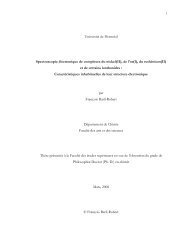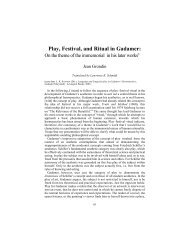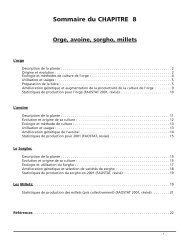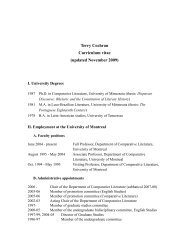Achilles and the Caucasus - Université de Montréal
Achilles and the Caucasus - Université de Montréal
Achilles and the Caucasus - Université de Montréal
Create successful ePaper yourself
Turn your PDF publications into a flip-book with our unique Google optimized e-Paper software.
<strong>Achilles</strong> <strong>and</strong> <strong>the</strong> <strong>Caucasus</strong> (K. Tuite) — août 17, 2007 — pg. 10<br />
<strong>Achilles</strong>’s parents circulate between <strong>the</strong>se two regions. Thetis, a<br />
Nereid whose home is beneath <strong>the</strong> sea, leaves her watery domain<br />
to marry Peleus (after he impregnates her in a cavern by <strong>the</strong><br />
seacoast), <strong>and</strong> <strong>the</strong>n returns abruptly after Peleus interrupts her<br />
attempt to immortalize <strong>Achilles</strong>. Peleus in a sense follows <strong>the</strong><br />
reverse trajectory when he engages in <strong>the</strong> hunt: leaving <strong>the</strong> oikos in<br />
search of game in <strong>the</strong> forests or mountains, <strong>the</strong>n returning home<br />
with his kill. When <strong>the</strong> two meet for <strong>the</strong> first time, Thetis, <strong>the</strong><br />
hunted, takes on <strong>the</strong> form of various natural phenomena (fire,<br />
water, wind) <strong>and</strong> wild animals, while Peleus, <strong>the</strong> hunter, holds on<br />
until she yields. This opposition between a god<strong>de</strong>ss associated with<br />
<strong>the</strong> natural world, <strong>and</strong> a human who exploits <strong>the</strong> riches of that<br />
world, will be of importance in <strong>the</strong> comparison proposed below.<br />
The child exploits <strong>the</strong> riches of nature like his fa<strong>the</strong>r, living off<br />
<strong>the</strong> flesh of wild animals, but unlike him he does not return to <strong>the</strong><br />
oikos. He is in a liminal state, nei<strong>the</strong>r fully at home in nature like<br />
his mo<strong>the</strong>r, nor in human society like his fa<strong>the</strong>r. 15 Homer appears<br />
to have been aware of this second duality in <strong>Achilles</strong>’ nature, since<br />
he represents <strong>the</strong> shield Thetis commissioned for her son as<br />
adorned with a microcosm of <strong>the</strong> Homeric world, in five<br />
concentric circles, moving from nature to society <strong>and</strong> back to<br />
nature (Iliad 18: 478-608). From <strong>the</strong> center outward <strong>the</strong>se <strong>de</strong>pict:<br />
(i) <strong>the</strong> earth <strong>and</strong> <strong>the</strong> sea, surroun<strong>de</strong>d by <strong>the</strong> sun, moon <strong>and</strong> stars;<br />
(ii) two cities, one in peace, <strong>the</strong> o<strong>the</strong>r in war; (iii) a royal <strong>de</strong>mesne<br />
surroun<strong>de</strong>d by fields, vineyards <strong>and</strong> pastures; (iv) a dancing-place,<br />
with young people dancing in a circle; (v) <strong>the</strong> mighty River<br />
Oceanos encircling <strong>the</strong> whole. As interpreted by Redfield, <strong>the</strong><br />
shield moves from nature to culture, <strong>the</strong>n to agricultural production<br />
(<strong>the</strong> inclusion of nature in culture); <strong>the</strong>n culture, <strong>and</strong> finally nature<br />
once again, at <strong>the</strong> outer limit. “The whole consists in a symmetrical<br />
equals; (iii) a limited <strong>de</strong>gree of commerce, associated with foreigners<br />
(“Phoenicians”) (see also Finley 1981: 211-32).<br />
15 The centaur Cheiron, who raises <strong>and</strong> educates <strong>Achilles</strong>, is an especially<br />
striking case in point, reflecting in his very body — half-human, half-horse —<br />
<strong>the</strong> conjunction of <strong>the</strong> human <strong>and</strong> <strong>the</strong> savage which lies at <strong>the</strong> heart of <strong>the</strong><br />
Thessalian <strong>Achilles</strong> saga (cp Escher 1899, Be<strong>the</strong> 1921).


